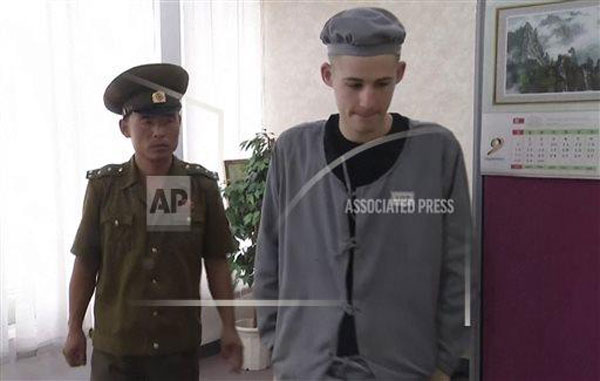US prisoner in DPRK sheds light on detention
Daily routine involves digging in fields and hours of isolation, but health is good, he says
A man from the United States who was recently sentenced by the Democratic People's Republic of Korea to six years of hard labor says he is digging in fields eight hours a day and being kept in isolation, but his health is good.
Under close guard at a Pyongyang hotel, and with only enough time to respond to one question from the Associated Press, 24-year-old Matthew Miller told of his condition.
He had been brought to the hotel to make a phone call to his family.
It was Miller's first appearance since he was convicted on Sept 14 of entering the country illegally to commit espionage.
"Prison life is eight hours of work per day. Mostly it's been agriculture, like in the dirt, digging around," Miller said when asked what conditions were like in prison.
"Other than that, it's isolation, no contact with anyone. But I have been in good health, and no sickness, no hurts," he said, showing little emotion.
Wearing a prison-style gray uniform and cap, Miller was photographed sitting at a phone booth at the hotel and pressing the buttons on a phone as a DPRK guard stood behind him. Officials said Miller spoke to his father, but the AP reporter was not allowed to listen. Miller does not have routine access to phone calls.
The Bakersfield, California, native showed several letters he had written pleading for help from influential figures in the US, including first lady Michelle Obama, US Secretary of State John Kerry and former US secretary of state Hillary Clinton. Miller then enclosed them in a letter he mailed to his family from the hotel.
At Miller's 90-minute trial, the DPRK's Supreme Court said that he tore up his tourist visa at Pyongyang's airport upon arrival on April 10 and admitted to having the "wild ambition" of experiencing prison life so that he could secretly investigate DPRK's human rights situation.
Miller is one of three US citizens detained in the DPRK. Jeffrey Fowle, who was arrested in May for leaving a Bible at a sailor's club, is expected to be tried soon. Korean-American evangelical Christian missionary Kenneth Bae was sentenced in 2013 to 15 years of hard labor after being accused of plotting to overthrow the government.
Last week, Robert King, the US special envoy for DPRK human rights issues, said Pyongyang had not accepted US offers to send a high-level representative to seek the release of the three men. King said freeing the detainees could provide a diplomatic opening in ties between the two countries, but Washington would not give in to attempts to seek political gain from the detentions.
King would not name the person the Obama administration was willing to send. Scott Snyder, senior fellow for Korea Studies at the Council on Foreign Relations think tank, said he was told by the administration that it has offered in recent weeks to send Glyn Davies, who leads US diplomacy on the DPRK's nuclear weapons program, but Pyongyang had not responded favorably.
In 2009, the DPRK detained two US journalists, Laura Ling and Euna Lee, who were later freed after former US president Bill Clinton visited Pyongyang. In 2011, former president Jimmy Carter visited the DPRK to win the release of Aijalon Gomes, another US citizen, who had been sentenced to eight years of hard labor for crossing illegally into the country.
|
 Matthew Miller is shown in a video in the Democratic People's Republic of Korea on Wednesday. The US citizen was sentenced to six years of hard labor for entering the country illegally to commit espionage. Associated Press |


















